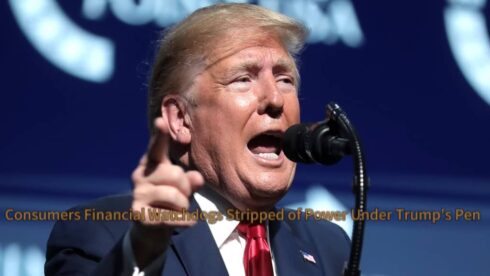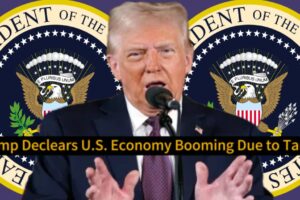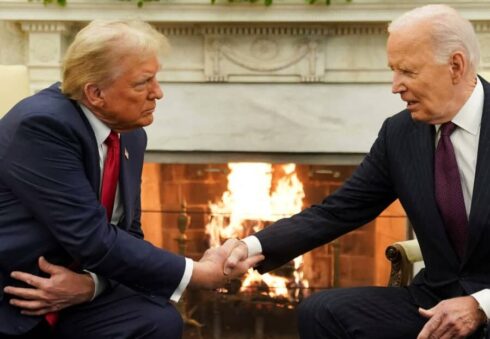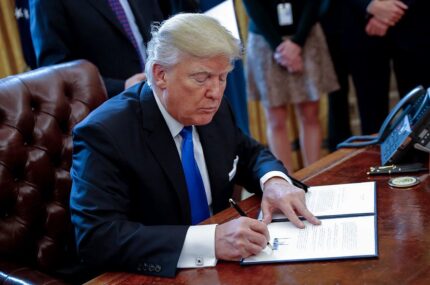Donald Trump has once again made headlines for siding with powerful financial institutions over struggling Americans. In a move that critics have dubbed “a betrayal of the working class,” Donald Trump signed a congressional rollback nullifying President Joe Biden’s widely supported cap on excessive bank overdraft fees. The rule, championed by the Consumer Financial Protection Bureau (CFPB), aimed to prohibit banks and credit unions from charging more than $5 or their actual cost on overdraft transactions — a move that would have slashed nearly $5 billion annually from the pockets of predatory lenders.
For countless Americans living paycheck to paycheck, Biden’s rule offered critical relief from a system rigged to penalize the poor. Financial watchdogs and consumer advocates applauded the original regulation as a long-overdue safeguard. But Trump’s reversal sends a stark message: under his leadership, corporate profit margins trump human dignity. Critics say it is a direct attack on the lower and middle classes, effectively giving banks a green light to continue profiting off financial hardship.
Consumer Financial Watchdogs Stripped of Power Under Donald Trump’s Pen
Donald Trump’s rollback didn’t stop with overdraft fees. In a double strike, he also dismantled a second vital protection: the CFPB’s authority to regulate digital wallets and payment platforms like PayPal, Venmo, and Apple Pay. These services, increasingly used by everyday Americans, have exploded in popularity — and along with them, so have abuses and opaque practices. The CFPB’s regulation was designed to bring transparency and accountability to the booming fintech industry.
But with the stroke of his pen, Trump gutted a rule that would have empowered regulators to rein in big tech’s dominance in the digital financial sphere. The rollback makes it easier for tech giants to evade oversight and continue data mining, hidden fees, and exploitative policies. Experts warn this could lead to a new Wild West in consumer finance, where everyday users are left unprotected in an increasingly cashless economy.
A Windfall for Wall Street, a Punch in the Gut for Main Street

Donald Trump’s dual rollback has been hailed by banking lobbyists and Wall Street interests — the very entities that have long fueled MAGA politics with campaign donations and backdoor deals. Industry insiders argued the overdraft rule would have “hamstrung” banks’ ability to profit, ignoring the human cost of $35 fees charged to people already in financial distress. This regulatory rollback has sparked outrage among progressive lawmakers and civic organizations.
What’s more, this decision further cements Trump’s image as a president beholden to corporate overlords rather than the American people. While billion-dollar banks celebrate increased profit margins, ordinary families are left bracing for renewed financial strain. The rollback not only widens the wealth gap but sends a dangerous signal that public protections are expendable when campaign donors come calling.
Digital Payment Chaos: Oversight Rollback Spurs Data Privacy Concerns
The CFPB’s digital wallet rule was also intended to address mounting concerns about consumer data protection. With platforms like Google Pay and Block handling billions in personal transactions, regulatory scrutiny was a long-overdue necessity. Trump’s rollback eliminates that oversight, leaving consumers vulnerable to unchecked data harvesting, surveillance capitalism, and algorithmic discrimination.
Without CFPB intervention, these platforms can freely impose arbitrary restrictions, manipulate user data, and exploit fee structures with minimal transparency. Cybersecurity experts warn the rollback may embolden bad actors and further entrench Big Tech’s control over financial data — with little to no recourse for consumers. Trump’s action here isn’t just deregulation; it’s deregulation in a sector already infamous for opaque practices and monopolistic behavior.
Congressional Review Act: A Political Loophole Weaponized
The mechanism Donald Trump used to strike down these consumer protections is as controversial as the rollbacks themselves. By exploiting the Congressional Review Act (CRA), Trump was able to reverse regulations implemented late in Biden’s presidency with minimal political fallout. Critics argue the CRA is being misused as a partisan weapon, enabling incoming administrations to erase their predecessors’ policies wholesale — regardless of public support or benefit.
In this case, Donald Trump’s move bypassed the typical checks and balances meant to ensure fair governance. The CRA’s 60-day window for rule review has become a ticking time bomb for last-minute reforms, encouraging lobbyists to bide their time and wait for political winds to shift. The rollback of these CFPB rules exposes a deeper flaw in the system: how easily progress can be unraveled when institutions prioritize politics over people.
Donald Trumps America: Corporations First, Citizens Last
At the heart of this issue lies a fundamental question: Whose interests does Donald Trump serve? By targeting regulations designed to protect the financially vulnerable, Trump is reinforcing a troubling pattern — one where the rich and powerful are rewarded while everyday Americans shoulder the cost. His presidency, marked by populist rhetoric, continues to deliver policies that disproportionately harm the very citizens he claims to champion.
From tax cuts for billionaires to gutting consumer protections, Trump’s track record paints a consistent picture: a government hijacked by corporate agendas. As the 2026 elections loom, Americans will remember who stood with Wall Street and who stood with them. With these rollbacks, Trump may have secured more donations — but he’s also ignited a firestorm of public anger that could cost him dearly at the ballot box.














